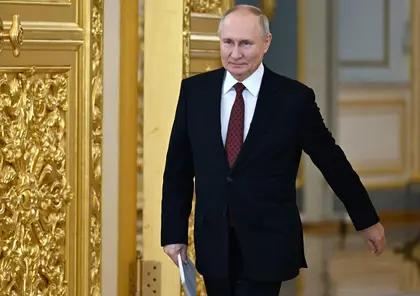As Vladimir Putin touches down in the Middle East later on Wednesday for visits to the UAE and Saudi Arabia, the Russian leader is brimming with confidence that would have been unimaginable six months ago.
A much-touted Ukrainian counteroffensive that was once expected to carve through Russian lines has stalled, oil revenue is rebounding as Russia learns to skirt Western sanctions, and a mutiny by Wagner mercenaries that once threatened his hold on power has almost been forgotten.
JOIN US ON TELEGRAM
Follow our coverage of the war on the @Kyivpost_official.
"Putin has certainly been speaking more confidently now than any time since the war began," said Nigel Gould-Davies, senior fellow for Russia and Eurasia at the International Institute for Strategic Studies.
Russia's front line has largely repelled Ukraine's counter-offensive, launched with billions of dollars worth of Western arms, and in Kyiv President Volodymyr Zelensky and his top military commanders are now at odds over whether the war has reached a stalemate.
In the West, support for bankrolling a third year of Ukraine's defence is already falling victim to political wrangling.
And at home, Russia's energy revenues have recovered, anti-Kremlin dissent has been silenced, and Putin is preparing to officially kick off his campaign for presidential elections in March -- a vote he is certain to win.
All that has fuelled a new sense of assurance in the Russian leader, analysts say.
"Russia has had an exceptionally bad war, but is betting the farm on Western apathy and a drawing down of support," James Nixey, head of Chatham House's Russia and Eurasia programme, told AFP. "They might be right."

Over 100K Ukrainians Return to Russian-Occupied Donbas as Economic Hardship Grows
- 'Third World War' -
Putin has long portrayed his invasion of Ukraine as just one front in a great power struggle with the West -- one he increasingly believes Moscow has the stamina and resources to win.
"They believe in the Kremlin that the Third World War is already going on -- and that they are better prepared than others," said Alexander Etkind, an international relations scholar at the Central European University.
"This gives them a lot of excitement. Life is meaningful again."
Moscow is set to portray Putin's trip to Abu Dhabi and Riyadh -- only his third outside the former Soviet Union since he invaded Ukraine -- as another sign Russia has defied the West's attempts to isolate it on the world stage.
And at home, too, Putin is stepping up his domestic appearances.
After cancelling last year's mammoth end-of-year press conference and a phone-in with Russian citizens amid simmering discontent over mobilisation, he is set to hold the event next week.
He could use it to announce his formal intention to stand for re-election in a vote that would extend his rule to 2030.
- 'All to play for' -
But experts warn that just as Putin's fortunes have recovered in recent months, they could turn downward again -- especially on the battlefield.
"Both sides have had their ups and downs in this war, taken pieces of land and had shock tactics that have worked. It's still quite finely balanced. It is still all to play for," said Nixey.
Moreover, war fatigue is not unique to the West, said Gulnaz Sharafutdinova, director of the Russia Institute at King's College London.
"Despite showing economic and social resilience in the short term, the long-term trends related to the militarisation of the economy are far from rosy," she said.
Inflation -- a historic source of angst among the Russian population -- is rising fast as Moscow adopts what analysts have called a "military Keynesianism", pouring billions of resources into the war effort.
Sharafutdinova said the Kremlin should still be "on high alert" for a possible backlash against the domestic sacrifices being made to support the war.
Rumours persist that the Kremlin is set to announce a new round of unpopular mobilisations after the election.
And the simmering discontent among the wives of men who have been drafted, as well as anger at pardons for murderers and rapists who agree to fight in Ukraine, have rattled the Kremlin in recent weeks.
But not enough to make Putin to change course.
"They will not stop," said Etkind of the Kremlin's strategy in Ukraine. "They can only be stopped."
You can also highlight the text and press Ctrl + Enter






